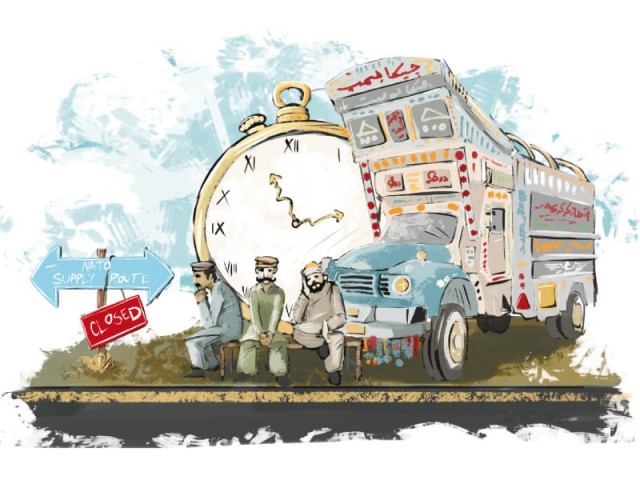Counting days: Nato suppliers hope for ‘business as usual’ soon
Transporters say that calls against resuming supplies will wither away.

The tankers and trailers are, of course, meant to supply the international forces in Afghanistan. Many of their drivers and conductors sit idle on charpoys smoking hash as they wait eagerly for the ban to be lifted.
As the debate rages on whether Pakistan should reopen the lucrative land route, the truck drivers and their powerful lobby of transporters that control their fate count the hours to the ‘inevitable’ day the route is reopened.
The Taliban have warned parliamentarians against supporting a resolution to reopen the route and the religious parties led by Maulana Fazlur Rehman have also been taking out rallies across the country. However, leading transporters associated with the business say that all this ‘noise’ will wither away once the state decides in their favour.
Privately, they say that too much money, literally ‘millions of dollars’, is involved in this business, and all stakeholders, whether it is the army or the extremists, would not want to lose out on any opportunity to milk the situation while it lasts for another two to three years. “This is all part of politics and, in our view, in a couple of months or sooner it will be business as usual,” said one leading transporter who asked not to be named.
Drivers suffer
Tabrez Khan, a boyish-looking driver of an oil tanker, said he missed the ‘thrill’ of going to Afghanistan, which in the last five years he has done ‘hundreds of times’. But Khan and his fellow hash smokers minced no words at hitting back at their ‘rich’ transporters. They accused them of making billions of rupees and giving them a standard rate of between Rs1,000 and Rs1,500 per day during the ‘good times’ when the route was open.
“But now quite a few have been laid off by our owners saying they can’t afford to keep us on their payroll anymore,” Khan said.
Hajji Anwar, a transporter, acknowledged that ‘some’ people had lost their jobs. “The drivers and conductors who get paid as daily wagers are the worst affected by the crisis.” But he insisted that the oil tanker and truck owners were still giving salaries to most of their drivers despite the losses they are suffering. “It’s hard to get a good driver who knows all the routes and has years of experience behind his back,” Anwar explained.
Transporter woes
The general manager of one of the biggest oil tanker businesses in the country, Mengal Brothers’ Abdul Qayyum, said these were tough times for everybody. “These days I’m managing by supplying oil at airports and other such installations within the country, but of course business isn’t as great as it was when the Nato route was open,” he said.
Qayyum said everything was in the power of the state and if it wanted to it could open the route tomorrow. Without explaining in detail about the reasons why he was hopeful, he said “the supply line should be restored soon.”
There are five major transporters in the business of supplying oil and goods to Nato forces. Apart from Qayyum’s Mengal Brothers, there is the Al Haaj group owned by Taj Mohammad Afridi, the Lagadia LLL transporters, Hajji Nazir and Bilal Logistics. The Pakistan Army’s National Logistics Cell was given the contract to supply the Nato forces in Aghanistan, which in turn sublets the contracts to these major transporters and others.
But assuming that the international forces in Afghanistan leave soon, don’t the transporters realise that the lucrative business is going to end soon, most likely within the next couple of years?
Al Haaj group’s Afridi said businessmen like him are aware of this time pressure. “But the problem with the current ban was that it happened overnight. We didn’t even get the time to reinvest our money into something else.” According to Afridi, if the government decides to reopen the route, he would recover his losses first and reinvest his money into some other business within that two to three years time frame.
But he said the government should ask itself this question: “Don’t they realise that this opportunity created thousands of jobs for the common people for whom there is no alternative industry where they can be accommodated,” he said.
Published in The Express Tribune, April 2nd, 2012.



















COMMENTS
Comments are moderated and generally will be posted if they are on-topic and not abusive.
For more information, please see our Comments FAQ